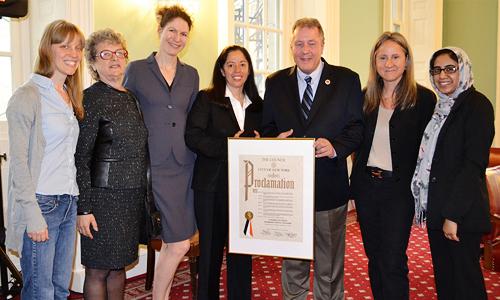New York City Council Honors Columbia Law Schools Immigration Defense Externship
New York, April 23, 2012—Columbia Law School’s Immigration Defense Externship program was honored by the New York City Council for its service to New York City’s immigrants. Council Speaker Christine Quinn and Council Member Daniel Dromm, chair of the Council’s Committee on Immigration, presented representatives of the Law School with a Proclamation at a City Council meeting on April 18, coinciding with Immigration Heritage Week.
Pictured left to right: Julie Braker '13 (fall 2012 teaching assistant); Ellen Chapnick, Columbia Law School’s Dean for Social Justice Initiatives; Shannon McKinnon (staff attorney); Maria Navarro (staff attorney); Council Member Daniel Dromm; Olivia Cassin (staff attorney); Faiza Sayed '12 (fall 2011 teaching assistant).
“I am especially pleased to honor the immigration externship programs at Columbia Law School,” Dromm said. "Their professors, practitioners, and students provide hope to immigrants entangled in our country's dysfunctional immigration system. Their victories, large and small, have impacted countless New Yorkers in individual cases and in the groundbreaking legal precedent they set."
The immigration defense externship places students with seasoned attorneys from The Legal Aid Society’s Immigration Law Unit on projects providing direct representation and counseling of immigrants facing deportation from the United States. Students interview clients, participate in trial preparation and litigation strategy meetings, and assist the attorneys in researching complex legal issues and drafting memoranda of law. They also observe proceedings in Immigration Court and may have the opportunity to represent a client before the court.
“The externship a great experience,” said Alex Leonard ’12, who recently served as an extern. “It is a fantastic opportunity to work in a complex, challenging area of the law, to interact with clients and help them resist the enormous consequences of deportation, and to see your work pay off— keeping families together and positively impacting many lives.”
There also is a weekly seminar that complements the students' fieldwork, with practice-oriented discussions of topics such as the interaction between immigration law and criminal law, the impact of the government's policies on the immigrant communities and ethical challenges arising from client interviewing and representation.
The program is one of many externships overseen by the Law School’s Social Justice Initiatives, and was expanded this year because of student interest and client need to include a section in the spring semester. Maria Navarro, a supervising attorney at Legal Aid Society, and Olivia Cassin, a staff attorney, teach the externship in the fall, and Amy Meselson and Shannon McKinnon, staff attorneys, run the spring externship.
As an example of the cases students work on, Navarro cited the Immigration Court defense of a lawful permanent resident of the U.S., a green card holder with two U.S. citizen children, who was threatened with deportation because of an old driving-under-the-influence (DUI) conviction. The woman, who had been abused by her father in her native Poland and had an alcohol problem for many years, was able to show that she had rehabilitated herself and she was allowed to remain in the U.S.
“Meeting and working directly with clients makes a big impact on the students,” Navarro said, noting that many go on to work in the field of the intersection of immigration and criminal defense law. For example, Bridget McDevitt ’12, will join the Legal Aid Society’s criminal practice in the fall, and Gabriel Reyes ’08 works on immigration cases as an assistant public defender in the Western District of Texas.
“I came to law school because I wanted to work in indigent criminal defense," said McDevitt '12. "I learned through the externship how much overlap there is between criminal and immigration law, and how important it is for criminal defense lawyers to understand the potential immigration consequences of any criminal convictions.”
